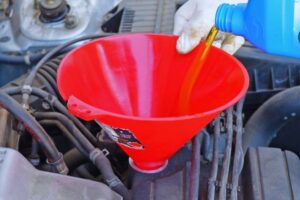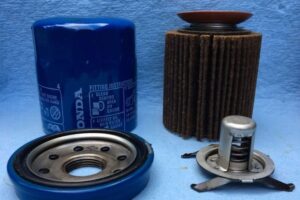Does it seem like your car’s steering wheel is a bit heavier than usual? If that is the case, your power steering fluid might be a tad low. If you are driving anything from GM, you may want to figure out if you should use its steering fluid. In that case, you can make your decision based on this GM Power Steering Fluid review.
GM power steering fluid is manufactured by ACDelco, one of the leading lubricant manufacturers in the world. This amber-colored, light-bodied mineral oil contains ACDelco’s specially-formulated additives to provide superior performance. In addition, this power steering fluid gained approval for use all year round. This means you do not need to have it changed with the seasons.
Read on to learn more about the GM power steering fluid and why you should use it.
About the GM Power Steering Fluid
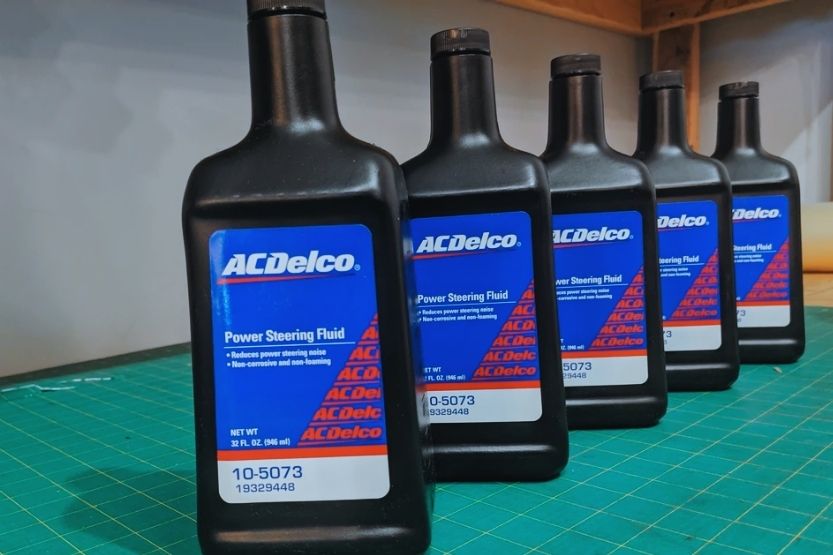
It is a misconception that General Motors make their lubricants and other consumables attributed to ACDelco. This is the Original Equipment Manufacturer (OEM) for everything GM. If you want to keep your vehicle in tip-top condition, stick to using ACDelco-GM products, including the power steering fluid.
Synthetic Lubricant With Special Additives Blend
The ACDelco GM power steering fluid is a synthetic lubricant containing a special additives blend. It helps protect the power steering system, therefore extending its lifespan. It does so by providing enough lubrication so the parts in the system would glide over each other smoothly.
Reduces the Sound from Loud Power Steering Pump
This also helps the power steering pump from getting too noisy. It can sometimes be so loud that you can hear it from inside the cabin over the engine’s sound.
Types of GM Power Steering Fluids
There are two types of GM power steering fluids, namely:
1. ACDelco GM 10-5074 Power Steering Fluid
Click here to see it on Amazon.
This ACDelco GM power steering fluid makes use of a special anti-corrosive and non-foaming formula. It lengthens the fluid life of your vehicle while also keeping the parts of your power steering system protected.
It is also ideal for use in normal weather conditions. Moreover, it can lessen noise linked to power steering. The result is minimal noise in the passenger compartment.
2. ACDelco GM 10-5044 Cold Climate Power Steering Fluid
Click here to see it on Amazon.
As the name suggests, the ACDelco GM 10-5044 power steering fluid is for freezing weather. It takes pride in its low-temperature fluidity. This can contribute a lot to improving power steering response when the weather is cold. It also assures you of a quieter ride. The reason is that it is capable of lessening the squealing and noise of the pump.
Pros and Cons of the GM Power Steering Fluid
Pros
1. Can Replace Unavailable Power Steering Fluids
If your GM vehicle is older, likely, the prescribed power steering fluid is not available. This means you can no longer carry it anywhere. The good news is that the GM power steering fluid can replace it. It will also likely work better than the old fluid. Just remember to flush out the old power steering fluid first before pouring this one in.
2. Makes Even Old Cars Handle Like New
As mentioned earlier, this can replace the old, obsolete power steering fluid of old GM models. This newer version of the GM power steering fluid is fully synthetic. It also contains new additives that further improve the old formula.
3. Eliminates Noises from the Power Steering Pump in Older Cars
This power steering fluid effectively removes the whining noises that usually come out from the power steering pump. It does so, especially during the colder winter days, making vehicles quieter.
4. Does Not Freeze Even in Sub-Zero Temperatures
GM power steering fluid will not freeze and turn into slush. This means that you do not need to worry about the lines in your power steering system bursting. The reason is that the fluid inside the pipes remained liquid.
Cons
A Bit More Expensive Compared to Other Brands
This product mainly comes from an OEM. Therefore, it is slightly more expensive than other brands’ regular power steering fluid. However, take note that GM recommends it for use in their vehicles. For that bit of extra cost, you are getting a guarantee from the manufacturer.
Can You Use Transmission Fluid Instead of Power Steering Fluid?
Use ATF to Top Up the Power Steering Fluid
If you need to top up your GM power steering fluid for any reason, you can use ATF instead. Both power steering fluid and ATF are hydraulic fluids. Your car’s power steering system runs on hydraulics just like its transmission.
ATF Helps Keep the Power Steering System Clean
In some cases, using ATF is better because it contains detergents that help keep the power steering system clean. Some car and truck brands even require ATF in the power steering pump. However, you need to check your car’s manual if that is the case for it.
Use the Manufacturer’s Recommended Fluid
It would be much better to use the recommended fluid of your car’s manufacturer. Besides, you can find power steering fluid as easily as you can ATF. It is nice to know that you can use ATF in place of the GM power steering fluid whenever necessary.
Is ATF Cheaper Than the Power Steering Fluid?
Using the manufacturer-recommended fluid in your power steering system will often be cheaper.
Why do many mechanics use ATF instead of power steering fluid if this is so? It might be due to convenience as not that many garages carry cases of power steering fluid. The reason is that you do not need to replace it that often.
Again, what is a GM power steering fluid? One of the leading lubricant makers worldwide, ACDelco makes the GM power steering fluid. This amber-colored, light-bodied mineral oil contains additives. With these additives, this fluid gives all-year-round superior performance.
Can You Use ATF to Top Off a Leaking Power Steering Fluid?
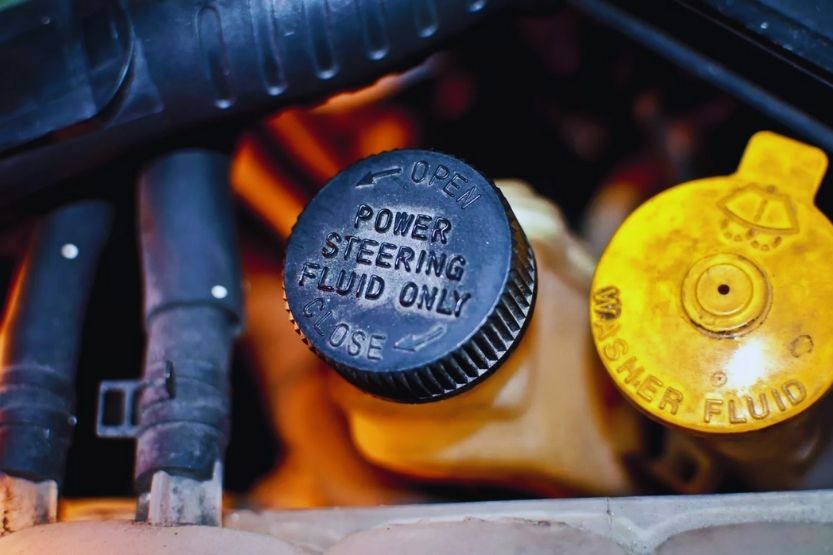
Have a Mechanic Identify the Reason Behind Leaking Power Steering Fluid
Yes, you can use ATF to top off the power steering fluid. However, it would be like putting a band-aid on a bullet wound. Take your car to the garage. After that, have a professional mechanic identify the reason for your car’s leaking power steering fluid.
If not, you will be continuously topping up the power steering fluid. In the process, you will also be slowly destroying the power steering.
Is the Power Steering Fluid the Same as ATF?
Now, another question is whether or not the power steering fluid is the same as ATF. Both are hydraulic fluids. However, the power steering fluid does not contain friction modifiers and detergents.
The reason is that they might damage the hydraulic valves used by the steering rack and pump. It might be beneficial to have some detergent, but using ATF long-term is not advisable.
Can You Use a Power Steering Fluid as an ATF Substitute?
Yes, and no. Yes, because power steering and automatic transmission fluids are both hydraulic fluids. This means using one in exchange for the other is not necessarily bad. It is not like putting gasoline into a diesel vehicle’s tank. ATF is superior in terms of additives compared to power steering fluid.
How Often Should You Change the GM Power Steering Fluid?
Not Necessary to Regularly Change the GM Power Steering Fluid
Unlike your car’s engine, the power steering system is typically the cleanest part of your car. This means it is unnecessary to change the GM power steering fluid quite often. Some car manufacturers do not even require changing the power steering at all.
Excessive Heat Quickly Oxidizes Power Steering Fluid
Note, though, that the power steering fluid will start collecting dirt and grime over time. This may cause it to get worn down due to friction and high temperatures. Also, if your engine has cooling issues, the excessive heat will make the GM power steering fluid oxidize fast.
The power steering does tend to last quite a very long time. However, just like engine oil, you should never test just how long you can go without changing it.
Change the Power Steering Fluid Every Five Years or 100,000 Kilometers
Changing your power steering fluid every five years or 100,000 kilometers is highly recommended, whichever comes first. This will help your power steering system keep working properly, thereby preventing costly repairs in the future.
Causes of Power Steering System Damage
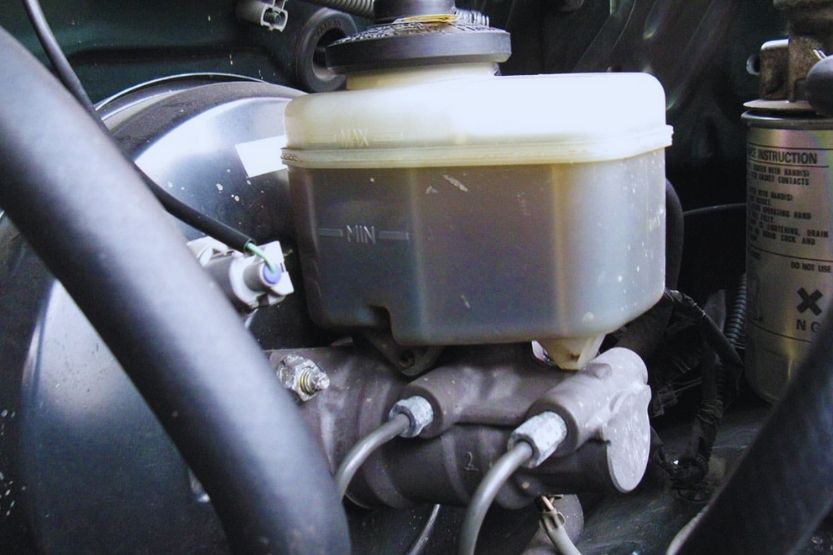
Have you ever tried driving an old car without power steering, like the 80s or early 90s? If you have, then you’d know just how groundbreaking power steering systems were. I could still remember how incredibly taxing it was to make three-point turns without power steering.
Power steering gave drivers more control over their vehicles. It made it much easier to swerve, avoiding unexpected obstacles on the road. With that said, you should treat the power steering system of your car with the care that it deserves.
As robust as the power steering system is, it is not invincible. Several things can damage your power steering system, and we will be discussing them in detail next:
1. Contaminated Hydraulic Fluid
Old Cars Use Hydraulic System
The power steering in older cars uses a hydraulic system. Note that most modern cars use electric power steering. These are capable of magnifying forces several times over. With that, you will only need a minimal amount of power to turn the steering wheel.
Clog the System
However, the hydraulic system can only work using clean hydraulic fluid. Contaminated hydraulic fluid could clog the system. The contaminants may also cause enough friction to cause the seizing of the entire system. If left unattended, it could cause the power steering pump to break down and fail.
Change the Power Steering Fluid
With that said, you should change the power steering fluid as per the manufacturer’s recommended interval. This is usually after 75k to 100k miles.
2. Too High or Too Low Power Steering Fluid Levels
In the case of hydraulic systems, like the power steering, using more fluid does not mean it can work better. The power steering system needs to use a precise hydraulic fluid to work efficiently. Too much fluid and the valves and seals might collapse from excess fluid pressure. However, not enough means it will not produce sufficient force.
3. Broken Belts
The car’s GM engine powers up the steering pump using a belt. If the belt gets loose, frayed, or broken, it can lead to the failure of the entire power steering system. If you start hearing a whining noise from your engine when turning the steering wheel, there could be a belt issue. It’s better to have it checked to find out if you need to replace the belt.
4. Damaged Steering Pump
The power steering pump is the main component of the entire system. Although the power steering pump is quite durable, it will wear down after many years of use. It may even wear out sooner if abused.
An example is when you habitually turn the steering wheel to the right and left. Have you noticed an unusual noise from your car when you turn a corner? Your power steering pump might be on its last legs if your answer is yes.
Can You Still Drive Without Power Steering?
Technically, you can still drive your car even if the power steering is broken or non-functioning. However, it will be challenging, especially if you need to navigate busy city streets. If your daily commute involves an hour or so of driving, you will undoubtedly feel sore when you get home.
Conclusion – GM Power Steering Fluid Review
One of the leading automotive lubricant manufacturers globally, ACDelco made and marketed the GM power steering fluid.
This light amber-colored and light-bodied mineral oil contain ACDelco’s special additives formulation that promises superior steering performance. In addition, you can use this product all year round, even in extreme winter conditions.
If you have any GM-branded vehicle, and it’s about time to change your power steering fluid, you should consider using this OEM product.
Related reading:




